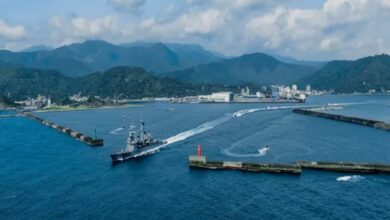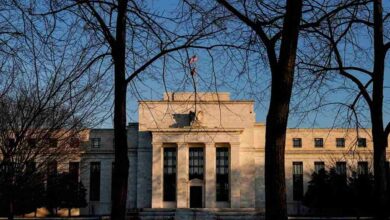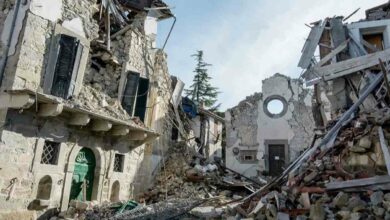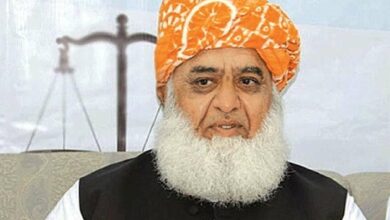PLA once again embroiled in a high-profile scandal
Hong Kong: Another high-profile controversy has rocked China’s party-controlled military, the People’s Liberation Army (PLA). Even after twelve years in command, the PLA doesn’t seem to be as clean as it was when Chairman Xi Jinping began his intense anti-graft effort.
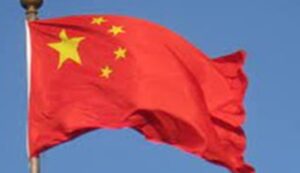
Admiral Miao Hua, the Director of the Political Work Department, is the most recent casualty. The Ministry of National Defense (MND) released a brief statement stating that Miao was “suspected of serious violation of discipline” in support of a statement made by Senior Colonel Wu Qian, the MND spokeswoman, on November 28. It said, “According to the decision of the Central Committee of the Communist Party of China, Admiral Miao has been suspended from duty, pending investigation.”
According to reports, Miao, a member of the six-member Central Military Commission (CMC), was arrested on November 9. Conviction is assured by the time such investigations are made public.
But it’s really strange that the MND, not the corruption agency, would make such an announcement.
“Since the announcement of the six-member CMC at the 20th Party Congress in October 2022, two have been under investigation: Li Shangfu and Miao Hua,” said Lyle Morris of the Asia Society Policy Institute’s Center for China Analysis in the USA. For Xi’s most dependable PLA commanders, who are carefully screened beforehand, this alone represents a significant failure.
Although Miao wore a naval uniform, he had mostly served in ground troops that confronted Taiwan. In fact, Xi’s administrative tenure in Fujian Province aligned with his deployments there. He was able to join the PLA Navy (PLAN) in December 2014 as its political commissar since he was Xi’s protégé. Xi’s tendency to try to go beyond traditional networks and cultivate personal devotion is reflected in his unorthodox cross-service reassignments.
Miao is the eighth member of the CMC to be expelled since Xi took office. On July 31, 2015, Xi personally promoted him to full admiral, and in October 2017, he was promoted to the CMC.
Joel Wuthnow of the National Defense University’s Institute for National Strategic Studies in the United States said, “Miao Hua’s fall is a big deal, because he was the ultimate insider—going back to his days in the 31st Group Army in Fujian, the same time as Xi.”
Wuthnow said, “One also has to wonder how much of this is about financial corruption and how much is about concerns over unchecked power centers springing up in the PLA.”
A wide range of transgressions, including undermining Xi’s political agenda, creating cliques and factions, failing to completely carry out Xi’s orders, or even endangering Xi’s political security, may be covered by charges of corruption. Regardless of Miao’s true offense, Xi seems to be becoming more suspicious as China’s economic woes deepen. There are now just five members of the CMC, including Xi as chairman, after Miao was suspended.
The director of the Political Work Department is effectively “Mr. Party Control,” since it oversees all promotions for top PLA members. All of Miao’s networks of patrons will now be extensively examined, given his last public appearance was in October.
In fact, who of Miao’s colleagues will be pulled down by the lethal suction of this investigative maelstrom? Most notably, Admiral Dong Jun, the Minister of Defense, seems to be involved. Dong served as PLAN deputy chief of staff from December 2014 to December 2017, while Miao served as PLAN political commissar from December 2014 to September 2017. In fact, Miao suggested that Dong be appointed defense minister when he was in charge of the Political Work Department.
Dong would be the third consecutive Chinese military minister to be jailed if these claims of his incarceration are accurate, as anonymous US sources indicate. He would be carrying on the legacy of Wei Fenghe, who was probed after his retirement, and General Li Shangfu, who was only in office for seven months. It’s interesting to note that Dong never had a position at the CMC.
The MND, however, disputes that Dong has been relieved of his position, which he took on in December 2023. “The reports in question are pure fabrications,” the official adamantly said. The people spreading the rumors have bad intentions. China said it is very offended by such defamatory actions.
However, after refusing to meet with US Defense Secretary Lloyd Austin at an ASEAN defense summit in Laos on November 21, Dong has not been seen in public. It should have been standard procedure for Dong to meet with Singaporean Vice Admiral Aaron Beng on his introductory visit to China, which took place from November 24 to 27.
At least 14 senior military individuals have been removed as part of Xi’s two-year purge of PLA commanders, which is one of the biggest in recent memory. The PLA Rocket Force (PLARF) and Equipment Development Department have been the targets of the purge, but the PLAN suddenly seems to be in the news. Midway through the year, the PLARF’s top two commanders were dismissed, followed by General Ding Laihang, a former PLA Air Force commander; Li Chuanguang, a former PLARF deputy; and Lu Hong, the chief of the PLARF weapons department.
According to rumors, Admiral Qin Shengxiang, the former PLAN political commissar, and Admiral Yuan Huazhi, the current one, are both being investigated. Because the sweater of patronage networks may quickly unravel once a thread is removed, the consequences in the PLAN are certain to be detrimental.
On October 11, Xiao Longxu, the former head engineer of the PLARF’s premier research institution, was dismissed. Since both were suggested by Miao, Wang Houbin, the recently appointed PLARF commander, and Hu Zhongming, the new PLAN leader, might also be implicated in Miao’s incarceration. Miao’s colleague Wang Chunning, the former head of the People’s Armed Police, is also suspected, as is Admiral Wang Renhua, the secretary of the CMC’s Politics and Law Commission.
According to rumors, Eastern Theater Command’s Lin Xiangyang was also taken into custody and may have passed away, perhaps by suicide.
Leaders at Norinco, CASC, CASIC, and CSSC have all been implicated, demonstrating that state-owned businesses engaged in weapons procurement have also come under scrutiny. “When combined, this is by far the biggest upheaval of PLA leadership and state-owned companies engaged in military procurement in recent history,” Lyle said. It implies a lack of confidence between Xi and the military as well as severe worry and disarray inside China’s military ranks.
“With the reforms in 2015, Xi has attempted to stabilize what’s considered an inherently unstable and delicate symbiotic relationship between the party and the military in one of the world’s last remaining modern communist-Leninist governance structures,” Lyle said. “These efforts have not been successful in eliminating corruption on a systemic basis, even if they could uncover more instances of bribery. This is due to the fact that there have been long-standing, profound problems with party-army ties since the time of Mao Zedong, when kickbacks and the buying and selling of promotions were commonplace for many years.
Thus, Lyle came to the conclusion that “a ‘few rotten apples’ are not the cause of corruption in China’s military. It’s a far bigger component of “doing business” in the PLA than in the majority of other military organizations worldwide, where significant instances of corruption and nepotism may be exposed by the rule of law and checks and balances. Corruption in the PLA will persist and plague Xi and his successor for the foreseeable future, regardless of Xi’s best efforts.”
Miao is accused of treason even though he was supposed to be in charge of the PLA’s political indoctrination! What does this indicate about Xi’s ideology’s level of popularity?
The PLA seems to be as dishonest and ideologically dubious as ever after more than ten years.
The issue could worsen even as Xi increases his degree of authoritarianism. It could suggest that the Chinese Communist Party (CCP) and PLA are still driven primarily by personal ambition and development, and that the principles of Xi and Chinese socialism are not widely accepted. Indeed, Xi may still have sway over the ruling class, but his political philosophy may not inspire much enthusiasm or drive among them.
Christopher Sharman, the director of the US Naval Academy’s China Maritime Studies Institute
According to War College, the removal of Miao begs three questions: Why is he being removed, will his allies also suffer, and what does this signify for China’s military and navy? “Even though there are still many unanswered questions regarding the reason behind Admiral Miao’s suspension, one thing seems to be clear: Xi Jinping is putting military control and effectiveness for major missions ahead of temporary internal security measures or symbolic prestige,” he said. It would be far simpler, easier, less expensive, and more straightforward to prioritize any of those later goals than the challenging, complex task he is ostensibly pursuing—possibly even in the midst of political infighting.”
“Obviously, this is not about corruption per se,” Sharman said. Graft has long been a feature, not a flaw, of the PRC system, including bribes, promotion-related pay-to-play, and the monetization of (mis)managed resources. Investigating corruption in the PLA mostly entails political choices since corruption is pervasive inside the organization. It is impossible to abolish corruption without dismantling the system, as the party is fundamentally above the law. Instead, Xi aims to impose allegiance, control, and the capacity to carry out top-priority military operations—most notably, against Taiwan—because he is determined to protect the system and his legacy at all costs. His main point is that these harsh requirements apply to everyone.
It is clear that Miao’s influence or activities posed a significant enough danger to Xi to justify the humiliating appearance of yet another high-profile arrest. Furthermore, Xi personally appointed these characters. What does this reveal about his character assessment, staff selection skills, decision-making abilities, and suitability for leadership? It also undermines Xi’s reputation and authority and provides anti-Xi elements in the higher levels of the CCP with additional fodder.
Cai Shenkun, a former reporter for Guangdong’s Southern Weekly newspaper who had a proven ability to foresee events before they were made public, said that Miao’s overemphasis on building a personal network was one of the reasons he lost Xi’s confidence. Factionalism, or “mountaintopism,” in which officials create their own power centers, has long worried CCP leaders.
Wuthnow hypothesized that Zhong Shaojun, who is now the director of the CMC’s General Office, may succeed Miao. Xi is still adamant about achieving his 2027 centennial military construction target in spite of this tragedy, and he is prepared to accept temporary obstacles as long as they guarantee the achievement of this ultimate objective.
In fact, Dr. Andrew Erickson, a professor of strategy at the US Naval War College, said, “There is no doubt that Xi will continue to prepare for or even wage war despite persistent corruption within certain bounds. CCP officials have long praised the ability of the totalitarian levers in their system to massively mobilize and concentrate men and resources, demonstrating the supremacy of their system.
“These are the acts of a power-hungry but sane and strong authoritarian leader who is extremely serious about planning for and possibly waging a major war,” Sharman said. Pervasive flaws in the CCP system include brutal elite power battles and the recent resurgence of the long-running official purge, which calls into doubt the PLA’s commitment and jeopardizes preparedness and capabilities. One of the CCP system’s many amazing advantages is its use of dictatorial tactics to drastically mobilize and concentrate troops and resources. This has profound effects on both sides.
Sharman stated, “As the ultimate product and head of this contradictory system,” Xi seems dissatisfied with his military and its leaders and doubts the durability and sharpness of the sword in his hand. Nevertheless, he is determined to use purges, reorganizations, and new campaigns to push his party army to achieve his goals. In order to force Taiwan and its allies to fight and eventually surrender, he is letting the PLA struggle now. He is still big and powerful, but he is a guy in a hurry who is running out of time on a steepening treadmill, and he is under danger from political rivals who will push him off if he makes a mistake.”
“Churn and challenges are certain, and crisis and conflict may follow,” the American scholar said. America and its friends, partners, and allies must make the most of their own military capabilities and plan appropriately.


